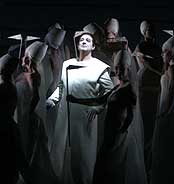 |
LA Daily News : "Domingo Defies Age in Parsifal" by David Mermelstein |
For years, some local opera-goers have lamented the absence of Wagner's "Parsifal" from the Los Angeles Opera's repertory. The hole it left might even be compared to the wound suffered by the knight Amfortas that lies at the heart of this meditative musical drama of faith, compassion and spiritual renewal. But that's all banished now, thanks to the company's mounting of Robert Wilson's lean production of the opera on Saturday night. Producing "Parsifal" is a benchmark in the history of any opera company, for it is generally regarded as the longest opera in the standard repertory and requires substantial musical forces, to say nothing of singers of stamina and dramatic - as well as vocal - range. As if to mark the occasion, L.A. Opera placed its general director, Placido Domingo, in the lead, a vigorous but naive youth who acquires extraordinary compassion through rude experience. The legendary tenor is nearly 64, but you wouldn't know it from the vibrant performance he gave on opening night. If he wasn't exactly golden-voiced, he sang freely, formidably and without strain. (It didn't hurt that the hair and makeup people made him look at least 20 years younger, nor that he appears to have dropped about 35 pounds recently.) Finnish bass Matti Salminen, one of very few singers who can compete with Domingo in the charisma department, complemented him. An imposing physical presence with a rich voice, Salminen lends potency to any production, but as Gurnemanz, the old knight who is effectively the opera's conscience, he is especially compelling. Not in the same league, to be sure, but nonetheless up to their tasks were bass-baritone Albert Dohmen, whose molasses-like voice vividly captured the hobbled Amfortas' pain, and soprano Linda Watson, in the difficult role of Kundry, the tortured character who serves variously as a symbol of distaff atonement and temptation. Though Watson struggled some in the first act, she offered warm effusions when it counted most, in the second. Smaller parts, too, were sung with commitment and musicality. Indeed, the only disappointment was bass Hartmut Welker as the fallen knight Klingsor, the opera's villain. He fairly croaked his way through his small but pivotal part and evoked almost no menace. Given Wilson's famously economical approach to staging - he takes on scenic and lighting design duties as well as directorial obligations_ it's hard to imagine an opera better suited to his metaphorical proclivities. Allegory reigns supreme here, and though Wilson pays no heed to obvious symbols of Christianity, this is still a spiritual journey. His costumes may be vaguely Asian, his sets tethered only to his imagination, yet his vision is ecumenical. The symbols may not always make sense, but they don't explicitly violate the essence of Wagner's drama. Of course, for some opera lovers, what matters most in "Parsifal," even more than the singing and certainly more than the staging, is what emanates from the pit. In an opera this rich - and long - there is always room for improvement. But it would be stinting to withhold praise from Kent Nagano, the company's music director, and the orchestra. To Wagner's gorgeous but potentially meandering score, they brought cohesion and coherence. And if their performance did not provide the spiritual epiphanies some had hoped for, well, there's always next time. |
